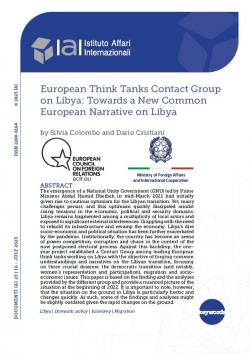European Think Tanks Contact Group on Libya: Towards a New Common European Narrative on Libya
The emergence of a National Unity Government (GNU) led by Prime Minister Abdul Hamid Dbeibeh in mid-March 2021 had initially given rise to cautious optimism for the Libyan transition. Yet, many challenges persist, and this optimism quickly dissipated amidst rising tensions in the economic, political and security domains. Libya remains fragmented among a multiplicity of local actors and exposed to significant external interferences. Grappling with the need to rebuild its infrastructure and revamp the economy, Libya’s dire socio-economic and political situation has been further exacerbated by the pandemic. Institutionally, the country has become an arena of power competition, corruption and chaos in the context of the now postponed electoral process. Against this backdrop, the one-year project established a Contact Group among leading European think tanks working on Libya with the objective of forging common understandings and narratives on the Libyan transition, focusing on three crucial dossiers: the democratic transition (and notably, women’s representation and participation), migration and socio-economic issues. This paper is based on the finding and the analyses provided by the different group and provide a nuanced picture of the situation at the beginning of 2022. It is important to note, however, that the situation on the ground in Libya is particularly hectic and changes quickly. As such, some of the findings and analyses might be slightly outdated given the rapid changes on the ground.
Study prepared in the framework of the project “European Think Tanks Contact Group on Libya. Towards a new common European narrative on Libya”.
-
Details
Rome, IAI, July 2023, 22 p. -
In:
-
Issue
23|16
Introduction
1. State-building and women’s representation and participation
2. The migration challenge
2.1 Macro-political economy of human trafficking
2.2 The role of EUBAM
2.3 The European legal and institutional framework to deal with migrations from Libya
2.4 Human rights violations
3. The economy
3.1 Libya as a rentier state: The background
3.2 Libya’s rentierism today
3.3 The issue regarding mentality
3.4 The oil sector
3.5 The EU example and involvement
3.6 Connections between the Libyan economy and international business environment
Conclusion



